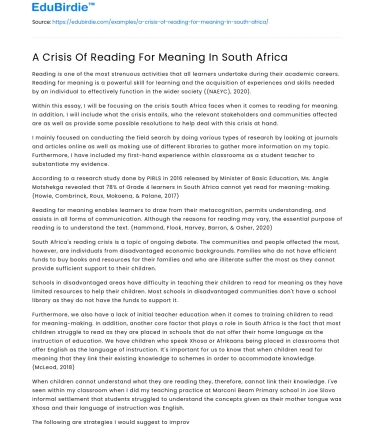Reading is one of the most strenuous activities that all learners undertake during their academic careers. Reading for meaning is a powerful skill for learning and the acquisition of experiences and skills needed by an individual to effectively function in the wider society ((NAEYC), 2020).
Within this essay, I will be focusing on the crisis South Africa faces when it comes to reading for meaning. In addition, I will include what the crisis entails, who the relevant stakeholders and communities affected are as well as provide some possible resolutions to help deal with this crisis at hand.
Save your time!
We can take care of your essay
- Proper editing and formatting
- Free revision, title page, and bibliography
- Flexible prices and money-back guarantee
I mainly focused on conducting the field search by doing various types of research by looking at journals and articles online as well as making use of different libraries to gather more information on my topic. Furthermore, I have included my first-hand experience within classrooms as a student teacher to substantiate my evidence.
According to a research study done by PIRLS in 2016 released by Minister of Basic Education, Ms. Angie Motshekga revealed that 78% of Grade 4 learners in South Africa cannot yet read for meaning-making. (Howie, Combrinck, Roux, Mokoena, & Palane, 2017)
Reading for meaning enables learners to draw from their metacognition, permits understanding, and assists in all forms of communication. Although the reasons for reading may vary, the essential purpose of reading is to understand the text. (Hammond, Flook, Harvey, Barron, & Osher, 2020)
South Africa's reading crisis is a topic of ongoing debate. The communities and people affected the most, however, are individuals from disadvantaged economic backgrounds. Families who do not have efficient funds to buy books and resources for their families and who are illiterate suffer the most as they cannot provide sufficient support to their children.
Schools in disadvantaged areas have difficulty in teaching their children to read for meaning as they have limited resources to help their children. Most schools in disadvantaged communities don't have a school library as they do not have the funds to support it.
Furthermore, we also have a lack of initial teacher education when it comes to training children to read for meaning-making. In addition, another core factor that plays a role in South Africa is the fact that most children struggle to read as they are placed in schools that do not offer their home language as the instruction of education. We have children who speak Xhosa or Afrikaans being placed in classrooms that offer English as the language of instruction. It's important for us to know that when children read for meaning that they link their existing knowledge to schemes in order to accommodate knowledge. (McLeod, 2018)
When children cannot understand what they are reading they, therefore, cannot link their knowledge. I've seen within my classroom when I did my teaching practice at Marconi Beam Primary school in Joe Slovo informal settlement that students struggled to understand the concepts given as their mother tongue was Xhosa and their language of instruction was English.
The following are strategies I would suggest to improve the reading crisis. Firstly, we need to encourage parents to read to their children. Although some families are extremely busy working to put food on their tables it is vital for parents to take the time needed to read to their children so that they can foster a love for reading.
Secondly, we need to make books more accessible to schools and improve our initial teacher education. Not all schools have the necessary funding for books however we can come up with initiatives to encourage other schools who come from a higher economical background to back-a-school and donate all their old books and resources to schools who need it. We also need to make sure that schools send their teachers to regular workshops and in areas where the schools are struggling, we arrange for teachers to be picked up from their schools and transport to the venues.
Another strategy is that we need to ensure that we encourage a culture for reading where we can and have programs in place to come to the schools and show learners various reading modes and techniques. (Howie, Combrinck, Roux, Mokoena, & Palane, 2017)
To conclude my findings, we can establish that reading for meaning is an important aspect for children to grasp. Although reading for meaning continues to be a challenging aspect with continuous support and guidance we can easily overcome this crisis together.






 Stuck on your essay?
Stuck on your essay?

